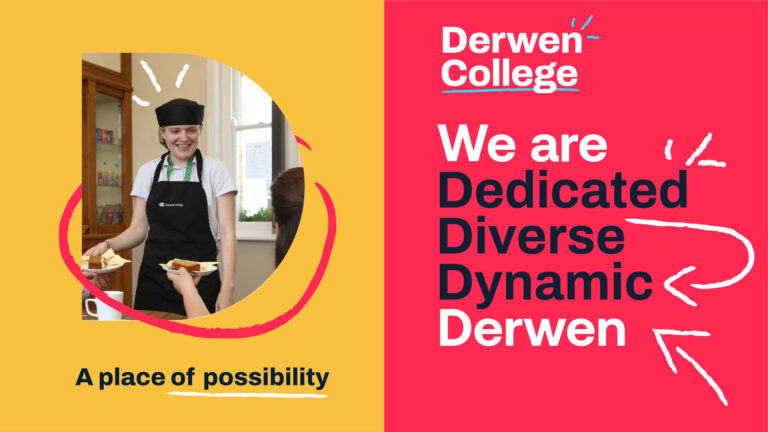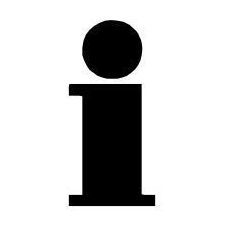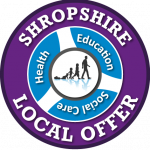Our Offer
Derwen College delivers work-ready and independence skills to both day and residential students.
We work across our large main campus at Gobowen, near Oswesty; and at our three satellite sites in Ludlow, Telford, and Walford near Shrewsbury.
Derwen’s focus is on individual outcomes for students with a wide range of learning difficulties, disabilities and behaviours of concern. Students at Derwen are provided with work placement opportunities throughout our extensive commercial operations and business partnerships.
Derwen College is approved by the Secretary of State for Education and is listed under Section 41 of the Children and Families Act 2014.

Contact information
General admissions enquiries:
Admissions Team: admissions@derwen.ac.uk 01691 661234 ext 401.
Access to all Derwen College programmes involves participation in a pre-entry assessment. This assessment covers aspects of work skills, functional skills, independence skills and other support services as appropriate to the individual. Combined with information from schools and other agencies, forms the basis of the students’ initial assessment and multi-disciplinary assessment inform programme planning and provision of tailored support.
Student progress and risk assessments are closely monitored once they are on programme. This ensures that each individual continues to receive the most appropriate support to enable them to achieve their potential in all aspects of college life.
For enquiries about your young person when they are at Derwen College
Contact your young person’s accommodation or Personal Tutor, who will signpost to the most appropriate person depending on the nature of the enquiry.
Location Information – Derwen College, Gobowen, Oswestry, Shropshire, SY11 3JA
Quality First Teaching Provided To All Students
Information about how Derwen College adapts the curriculum and learning environment for young people with special educational needs
All students have an Individual Learning Plan which forms the basis of their individual programme and is reported against, termly, from all aspects of the curriculum. Group sizes are appropriate to the support needs of the individuals.
Students follow personalised Study Programmes specialising in one of four pathway areas. As a student at Derwen College you will be working in your chosen pathway area:
- Gobowen, near Oswestry (day and residential provision)
- Ludlow (day provision)
- Telford (day provision)
- Walford (day provision)
In addition students develop their independence skills through Independence Health and Wellbeing sessions and activities.
Much of the learning takes place within real work environments on campus and in the local community. Students will access a range of internal work placement opportunities within their chosen pathway area and the operational and commercial outlets in college. The Work Experience Team have well-established contacts with a wide range of external work placement providers in Oswestry and the surrounding area and work opportunities can be linked to the home area where appropriate.
All pathway areas, including work placement venues have relevant specialist equipment and individualised learning resources. This ensures maximum participation and independence for the students working in that area.
Some examples include:
Makaton support – Derwen College has achieved Silver Level Makaton Friendly status, and are currently the only specialist college to achieve Silver status. As a result signing and symbols are widely used across college. Teaching and learning resources are available in text and symbol versions to support comprehension and access. Personalised pictorial timetables and targets are used where appropriate.
Accessible ICT equipment – Accessible ICT equipment is available depending on individual needs. Wifi is available in key areas across the campus. In vocational areas students have access to the latest printer technologies with voice recognition and adjustable keypads. Photocopiers are available in three different height settings.
Accessible resources – Rise and fall desks and work benches, pen grips, large calculators, left handed equipment, easy hold rulers, adapted staplers, height adjustable sinks in art learning area, special equipment available in kitchens, including left-handed cutlery and crockery and soft grip cutlery, adapted devices to support students with limited mobility working on food preparation, adapted gardening equipment, accessible pathways, ramps and automatic doors across the campus, library facilities.
SEN Support
Key staff involved in supporting students at Derwen College include:
Personal Tutor – every student has a Personal Tutor who is responsible for monitoring progress and making sure that the student’s wishes and aspirations are taken into account at all times.
Counselling – students may request counselling themselves, or may be referred by a member of staff.
Nursing – we have a team of qualified nurses and a skilled health support worker all experienced in delivering care to students.
Behaviour support – some students may display behaviours of concern. They may be supported in department and residence by experienced Positive Behaviour Support staff.
All of these qualified professionals are able to make referrals to more specialist support if they deem it necessary.
Tracking Progress
Information on how students’ progress towards any outcomes are identified, and how their needs will be assessed and reviewed. Parents/carers and young people will take part in any assessment and review
How are targets identified – involvement of students and parents
Initial assessment – student and family views and aspirations are gathered as part of the pre-entry process. This information is then taken into account alongside assessment outcomes and an Individual Learning Plan developed. The plan identifies long, medium and short term targets which are then regularly reviewed.
Process of putting plan in place and making adjustments to teaching
Formative review – The learning plan is shared electronically across college and forms the basis of person-centred planning for teaching staff. The plan is reviewed with the student termly. This review is led by the Personal Tutor. The Individual Learning Plan progress review report is sent to Local Authority stakeholders and parents at regular intervals throughout the programme. Review meetings take place at strategic points of the programme and parents and relevant Local Authority personnel are invited to attend. The college recognises the importance of these meetings and can offer support to those who are not able to attend due to travel time via various platforms for video linking.
Summative review – Parents and relevant Local Authority stakeholders are invited to attend a transition meeting which takes place in the first term of the final year, thus allowing good time to plan for next steps, which includes the summative review.
How is progress tracked – assessment tools for small steps
In addition to tracking progress against qualifications the college uses a central database for capturing and monitoring progress against an individual’s short term targets. This is accessible to all staff across college who input their comments with regards to progress against specified targets. Information from the database is then used by Pathway Leaders and Personal Tutors to report progress and review targets. Additionally, there are subject experts who have key roles across college e.g. Functional Skills Core Team who have responsibility for English and maths learning and monitor individual’s progress on a regular basis.
Systems to get student back on track if progress is not as anticipated
Regular and ongoing review through the systems described ensure that help is quickly put in place if student’s progress is not as expected. Interventions include speech and language therapy, occupational therapy, positive behaviour support, functional skills support, personal tutor involvement, pastoral support. Any of these interventions might bring about a review of the individual learning strategies and targets. Throughout, student views and input are paramount.
Transitions
Information about how Derwen College supports students moving between phases of education and preparation for adult life, so that they can achieve good outcomes.
Young people coming into the college
Derwen College provides lots of opportunities for prospective students and their families to come along and see our facilities and find out about our provision, for example, open days, Summer Fete and Short Breaks provision. The admissions process includes visits, refresher visit opportunities and taster sessions that are all excellent ways of supporting transition into college life. School visits to the college can also be arranged.
Transitions between key stages
Ongoing informal and formal reviews with personal tutors, Pathway Leaders and, if appropriate, any of the aforementioned support teams ensure that students move through their programme seamlessly. Communication between college and home is open and ongoing.
Transitions when students leave college
Information, advice and guidance to support ongoing transition is a key priority for the college and is provided in many ways – some examples are given below:
Progress updates and the transition review meetings
are key to ensuring that, in addition to progress being shared, the student is able to express their aspirations to those who support transition into the next stage of their lives.
Employability Skills programme
All students participate in this programme which includes three set modules (Getting Myself Ready for Work, Exploring the World of Work and Career Planning). The programme also includes embedded IAG across all curriculum areas and access to external careers advice and guidance.
Work Placement programme
Alongside the many opportunities in the social enterprise areas on site, the college also offers work placements with a wide range of external employers including national chains.
The Job Explorer Database (JED) is available on the student desktop to promote career choice for all.
Regional and national events – The college support students to attend regional and national events e.g. student’s local area transition events, The National Skills Show
The college hosts an Experiential Careers event where students have the opportunity to ‘have a go’ at some activities in work areas they may not have thought of before and also the opportunity to talk to some employers about their industry.
Preparation for adult life
All Derwen College programmes, whether day or residential, are about preparing for adult life. All students learn to look after themselves with the view to being more independent and, therefore, needing less support. As well as learning work skills and putting these into practice in real work settings; students have opportunities to develop their independent living, personal and social skills. Examples of this include cooking and learning about healthy lifestyles, exploring the local and wider community, developing road safety and travel skills and exploring aspects of personal and social development and citizenship.
Sports and leisure
Part of college life is about learning to manage a social life. The campus is a vibrant community with a vast range of clubs and events. This includes sporting activities such as swimming, gym, basketball, cricket, cycling, football, wheelchair basketball and many more. Students also have the opportunity to take part in community groups such as attending church and using the local leisure centre.
Independent living
Residential students have accommodation to suit their differing needs and aspirations. This includes staffed ‘halls of residence’ type accommodation, and staffed and non-staffed shared houses. Accommodation decisions are student-centred and are taken with aspirations and ability in mind. Safety is always the key priority – robust risk assessment is central.
Quality Of Provision
Information about how the effectiveness of special education provision is assessed and evaluated, including information about how parents and young people will take part in any assessment and evaluation
Derwen College has robust quality assurance and performance management systems in place to ensure we have the right people doing the right job for each student we support. Our consistently high quality of provision is endorsed in the following ways:
Ofsted – The college is inspected by Ofsted. Report attached to this link.
Care Quality Commission (CQC) – The college is inspected by CQC. Report attached to this link.
Derwen College also holds Matrix Standard
Derwen College is Makaton Friendly – Makaton tutors deliver cross-college support to staff and students.
The college has won several national awards in recognition of its commitment to learner voice.
Central to this quality system is the annual Self Assessment Report process, the outcomes of which inform quality improvement planning for the following year. All staff are involved in the process which covers all areas of the curriculum. Students, college staff, governors and peer partners are involved in the moderation of self-assessment to ensure input from all areas.
Governors’ and Trustees’ involvement and responsibilities
The governors have board meetings with key staff and in addition they have link roles with pathway areas. There is a Business and Finance committee, Curriculum and Quality committee, Human Resources committee, nominated governors for Student Council, Health and Safety, Safeguarding, Appeals, Equality and Diversity.
The College also routinely seeks the views of other groups in different ways
Examples include:
Student satisfaction surveys – for current students
Student destination survey – for ex-students
Stakeholders survey – for prospective students and their families, parents and carers and professional partners
Employers survey – for work placement providers
Student Council activities – very active at Derwen College with representatives from all pathway areas
Learner Voice – students involved in all key cross-college meetings and take important roles in many aspects of college business including recruitment.
Information about how the expertise in supporting young people with special educational needs is secured for teaching staff, and others, working with young people at Derwen College
In addition to statutory training requirements Derwen College has a culture of continuous improvement and encourages staff to develop their vocational and professional expertise in line with the evolving needs of our student group.
We have some staff with specialist SEND qualifications – examples include: dyspraxia, applied behavioural analysis & challenging behaviour, ASD, ADHD, dysphasia, functional skills, family therapy, professional counselling, speech and language therapy.
The college uses a robust annual staff appraisal system and there is a wide range of CPD opportunities for staff including seminars, conferences, peer review work and bespoke training.
All staff
Staff have a mandatory induction when starting at Derwen which includes health & safety, safeguarding, Equality and Diversity.
All staff have the opportunity to access specialist training in ASD, ADHD, dyslexia, Makaton, POVA, deprivation of liberties, understanding mental health, understanding diabetes, epilepsy, nutrition & health, equality & diversity, safeguarding medicines, infection control, working with individuals with learning difficulties, preparing for work in social adult care.
All staff are trained in the Shropshire safeguarding board, raising awareness in safeguarding.
Care staff
The majority of care staff are qualified to N.V.Q level 2 or above and take mandatory CPD courses.
The college uses a robust annual staff appraisal system. For care support staff appraisal is supported by regular supervisions.
Teaching staff
All teachers have teacher training qualifications level 4 or above and vocational specific qualifications.
Learning support staff are all qualified to level 2 or level 3.
The college uses a robust annual staff appraisal system. For teaching and learning staff this is linked to an annual graded teaching observation and development of a personal CPD Action Plan.
The following teams are in place to support excellence in teaching and learning across the curriculum:
Learning Mentors – this group ensure quality and consistency of teaching and learning delivery across the curriculum.
Functional Skills Links – one in each pathway area to support the delivery and assessment of functional maths and English.
Makaton Tutors – in addition to our Senior and Regional Tutors we have one trained local tutor in each pathway area to ensure consistent use of Makaton.
Digital Practitioners – one in each pathway area to provide support and inspiration for the creative use of ILT with our students.
Equal Opportunities
Information about how facilities that are available can be accessed by young people with special educational needs, and what activities are available for young people with special educational needs in addition to the curriculum
Derwen College is committed to the promotion of equal opportunities in all its services. We believe that all forms of prejudice and discrimination are unacceptable.
We seek to ensure that everyone is able to reach their full potential and to do this we want to create a working and learning environment where we are equality confident. This means that everyone is encouraged to participate and feels that their contribution is valued. The college is committed to supporting and actively encouraging a diverse community.
Students also have the opportunity to take part in community groups such as attending church and using the local leisure centre. We have a weekly visit from Church of England vicar, Harvey Gibbons, from St Oswalds in Oswestry for a Praise and Prayer session.
Student engagement officers pro-actively work with students at evenings and weekends.
Parent/carers have the opportunity to help students make choices in leisure, social and weekend activities and trips. Students are given the opportunity to make choices of sports and enrichment sessions with personal tutors.
Derwen College is using the legal framework as a basis for activity specifically relating to race, disability and gender, though our Single Equality Scheme includes all seven strands: race, disability, gender, religion and belief, sexual orientation, age and gender identity/transgender.
Complaints and compliments
Please contact Carol Thompson, Clerk to the Trustees & Company Secretary, Head of Communication: haveyoursay@derwen.ac.uk or on 01691 661234 (ext 291)
How young people’s emotional and social development is understood and supported
Student services co-ordinators – support student’s emotional, social, leisure needs.
Lead Practitioners – Point of contact for care. In addition all residential students have an identified key worker linked to their residence.
Support Practitioners – highly detailed assessment of need at admission. This ensures that students’ health and wellbeing are monitored effectively during their programme. Care support staff motivate students to take an active interest in their care plans and the progress they are making towards their full potential of independent living within the community and employment.
The college has an holistic approach to providing emotional and social support for students
Behavioural support team – 1:1 support when appropriate
Counselling support where needed
Pastoral support – provides a safe environment to discuss worries and anxieties.
Peer mentors – Student Council representatives.
Independent advocates – can be arranged externally.
Specialist services – referrals when appropriate.
GP attends college on a regular basis and all students have open access to the on-site nurses.
Student engagement officers – pro-actively working with students on evenings and weekends.
All these services are highly effective in enabling learning across the curriculum.
Personal Tutors – All students have regular individual personal tutorials providing high quality curriculum support leading to excellent progress on their individual programmes. The support is individual to the identified needs of each student, for example, some students have additional informal tutorials and all have access to their Personal Tutors through email and face to face contact.
The college has a robust Anti-Bullying Policy. It is committed to providing a supportive, friendly, safe and positive environment, free from offensive behaviour. Derwen College does not tolerate bullying. Students are urged to speak to staff about any bullying incidents. Incidents will be dealt with promptly and effectively. The college strives to help each student achieve his/her learning goals and get the most out of the experience of college life.


